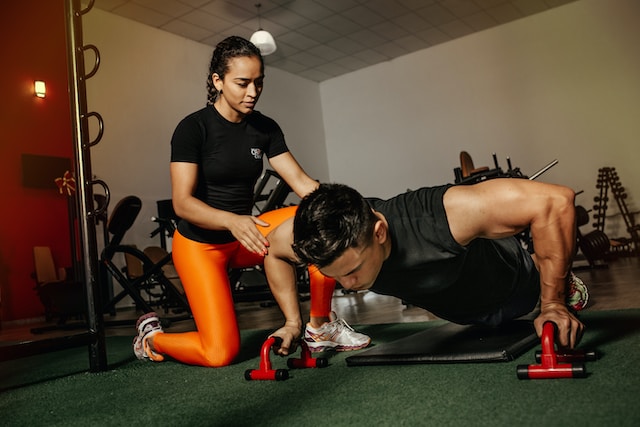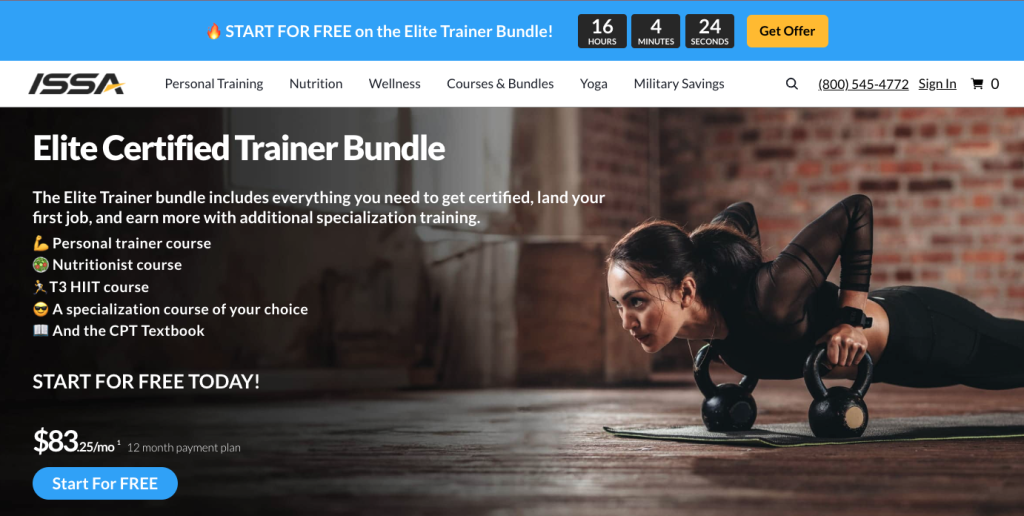
This post may contain affiliate content from which we earn a small commission at no additional cost to you. Read our full disclosure.
Are you dabbling with the idea of becoming an athletic trainer but not sure how exactly to do so? If so, you’re not alone! Becoming an athletic trainer is not an easy job, but it sure is rewarding.
In this guide, we’ll dive deep into what an athletic trainer does and the requirements for becoming an athletic trainer. We’ll also dive deep into the steps you need to follow to be successful in this industry.
With that said, let’s dive in.
What Does an Athletic Trainer Do?
An athletic trainer plays a big role in supporting athletes’ health and performance. They assess and treat injuries, providing immediate care and rehabilitation strategies.
Prevention is a key focus, with trainers developing exercise programs and offering guidance to minimize injury risks. Communication with coaches, athletes, and healthcare professionals is vital for comprehensive care. Beyond physical health, they address mental and emotional aspects, promoting overall well-being.
Athletic trainers act as an important link in the sports ecosystem, ensuring athletes maintain peak physical condition, recover from injuries, and receive holistic support for optimal performance and long-term athletic success.
Do You Need a Degree to Become an Athletic Trainer?
Yes, a degree is essential to become an athletic trainer, with a bachelor’s degree being the minimum requirement. Many athletic trainers pursue a master’s degree, preferred by most employers.
The curriculum includes medical-focused courses in biology, anatomy, nutrition, sports medicine, and kinesiology. Certification from the Board of Certification (ATC) is also important, and continuing education is necessary to maintain certification.
If you’re an aspiring athletic trainer, we’d also recommend ISSA’s certification for its comprehensive and respected program.
Obtaining ISSA certification for athletic training brings multiple benefits. With flexible payment plans and a job guarantee, ISSA ensures a solid start to your career. As a leader in the industry for 25 years, ISSA’s certification is highly regarded, enhancing your resume’s appeal in the competitive job market.
That said, if you’re interested in trying ISSA, click here to get started right away!
Checkout Code for an additional $100 OFF:


ISSA Certifications - 75% Off
Do Athletic Trainers Need a License?
Whether an Athletic trainer needs a license or not depends on the state or country. Generally speaking, the license requires a certification exam by the Board of Certification for the Athletic Trainer.
The specific licensure criteria vary by state and country, so be sure to do careful research based on your practice location. If you’re from the US, note that obtaining a CPR certification from the American Red Cross is a standard requirement across states.
This essential step ensures that athletic trainers are well-prepared for emergencies. It emphasizes the importance of life-saving skills in their practice. Always check and fulfill the specific licensure mandates of the state where you plan to pursue a career in athletic training.
Steps to Become an Athletic Trainer
Here we’ll explore the steps you should follow to become an athletic trainer:
Get a Degree
The first step toward becoming an athletic trainer is earning a degree. Most employers seek candidates with a bachelor’s degree in exercise science, kinesiology, biology, or a related field. It’s important to enroll in a program accredited by the Commission on Accreditation of Athletic Training Education for certification eligibility post-graduation.
Throughout the program, students acquire skills in injury assessment, first aid, and illness prevention.
Coursework covers subjects like human anatomy, applied kinesiology, exercise physiology, nutrition, pharmacology, therapeutic exercises, and injury prevention and management. This way, it provides a comprehensive foundation for a successful career in athletic training.
Get Clinical Training
The next step is to get clinical training. Accredited programs often provide clinical training so students can get valuable practical experience in medical or healthcare settings. In these sessions, you may shadow seasoned athletic trainers, engaging in basic tasks under their supervision.
Opting for clinical training in diverse environments such as high schools, colleges, hospitals, rehabilitation centers, or doctor’s offices allows you to seamlessly apply classroom knowledge to real-world scenarios. This hands-on approach improves your skills and prepares you for the dynamic challenges of athletic training in various professional settings.
Get a Certificate
After obtaining a bachelor’s degree from an accredited program, the next step is obtaining certification to practice as an athletic trainer. State licensure often mandates certification.
Contact the Board of Certification for the Athletic Trainer to schedule the certification exam. It’s a comprehensive test that evaluates expertise in injury prevention, wellness promotion, assessment, diagnosis, immediate and emergency care, therapeutic intervention, and healthcare administration.
The board provides study materials and practice exams to facilitate preparation for this crucial step. This ensures a solid foundation in essential areas for aspiring athletic trainers. The certification exam typically spans approximately four hours.
Apart from that, it’s worth getting a well-recognized fitness certification like ISSA. As an industry leader for 25 years, ISSA provides a top-rated, high-quality program.
Acquiring certification from this reputable institution levels up your resume, standing out in a competitive job market. ISSA ensures career success and offers a money-back guarantee and flexible payment plans for a stable start.
If you’re interested in doing ISSA certification, click here to get started right away!
Checkout Code for an additional $100 OFF:


ISSA Certifications - 75% Off
Craft Your Resume
Upon securing certification, the next step is crafting a resume for athletic training job applications. Emphasize your education, clinical training, and certification to showcase relevant skills and abilities. If you possess experience in gyms, fitness centers, or related facilities, include it on your resume.
Tailor each resume to specific job requirements, incorporating keywords from job descriptions. A professional summary at the resume’s top targets keywords efficiently and captures the hiring manager’s attention.
Regular proofreading ensures accuracy and professionalism, enhancing your chances of securing athletic trainer positions that align with your qualifications and aspirations.
Consider a Master’s Degree
Some athletic trainers opt to pursue a master’s degree for a competitive edge. Explore graduate programs aligned with your career objectives, combining advanced coursework and clinical experience.
This improves your skills and provides a comprehensive understanding of the athletic training domain. Researching and selecting programs tailored to your interests and aspirations ensures a beneficial and targeted educational experience. It further levels up your qualifications and potential in the athletic training profession.
Apply to Jobs
Apply to athletic training jobs by submitting tailored resumes that emphasize your qualifications. Stand out by reaching out directly to athletes, teams, or sports organizations.
Contacting athletes or their managers showcases initiative and a proactive approach. You can also make use of networking events, industry connections, and social media platforms to expand your job search. Again, tailoring your application strategy can help you secure opportunities beyond traditional job postings.
Key Takeaways
To become an athletic trainer:
- Earn a Degree: Obtain a bachelor’s degree in exercise science or related fields.
- Clinical Training: Gain practical experience through clinical training, shadowing, and tasks under supervision.
- Certification: Obtain certification through the Board of Certification for the Athletic Trainer.
- Exam: Take a certification exam evaluating key areas in athletic training.
- Resume and Job Search: Highlight education, clinical training, and certification in job applications and customize resumes for each position. Consider earning a master’s degree for advanced qualifications. Apply creatively, such as reaching out to athletes or managers.
- Online Vs In-Person Certification Courses: Pros & Cons - April 23, 2024
- Tips for Acing Your Fitness Certification Exam - April 21, 2024
- Balancing Work-Life as a Fitness Trainer: Complete Guide - April 19, 2024
Disclosure: In the spirit of full disclosure, DIYactive.com may be compensated in exchange for featured placement of certain reviews or links on this website. View our full disclosure.





